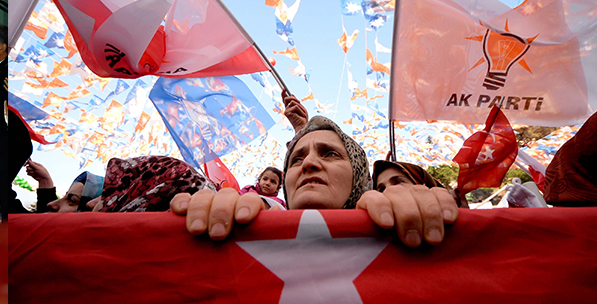After the Dec. 17 operation, the local elections that are supposed to take place on March 30 have come to mean much more than local elections. Even if Dec. 17 had never happened, March 30 would still have meant much more than local elections. In fact, the upcoming presidential elections in 2014 and general elections in 2015 had already transformed the meaning of the March 30 local elections. The fates of all three upcoming elections are tied to each other and the March 30 polls are the first step in the “relay race” that Turkey is launching. The party that prevails on March 30 will have gained an advantage in the other two elections.
How the crisis that emerged from the Dec. 17 operation will be reflected in the elections is quite interesting. It appears that transcripts of the hundreds of calls that the police-judiciary junta, whose relationship with the Gülen group has become public knowledge, eavesdropped upon – including high-ranking public officials, the prime minister, minsters and journalists – have become the only campaign material. Not even a sentence regarding municipal elections is being uttered during the campaign. The wiretaps obtained by members of the police and the judiciary are being both legally and illegally leaked to the opposition parties to use as campaign material. The opposition parties are breaking the law by using these tapes during the race. They think they are hurting PM Recep Tayyip Erdoğan this way.
However, we are faced with a unique situation. Not only is the AK Party campaign going well, but the polls show that the AK Party is as strong as ever. Some 40 percent of the votes in elections represent a crushing victory in Turkey. A few weeks before the elections, it appears that the AK Party will have around 40 percent. Campaign events demonstrate a newfound enthusiasm, even in cities where support for Erdoğan had been relatively weak. It is as if the people are rushing to fix the hole in the castle wall that the Gülen group wanted to create, in order to prevent the old Turkey’s political actors from sticking their head in. Each leaked recording, each decontextualized wiretap creates a bit more unease, motivating the masses to run to fortify the castle walls.
So why are these leaked wiretaps not causing the AK Party to lose votes and the opposition to gain more votes? And why does the opposition not give up on this strategy in which they have broken the law, when it is clearly failing to bring in the votes? The answers to these two questions hold the key to understanding both the March 30 elections and their aftermath.
It is because the leaked wiretaps only serve to strengthen the citizens’ perception that the AK Party is being sabotaged by forces external to politics. In fact, the people are reminded of past coup d’état attempts and are thus rallying around Erdoğan.
The opposition has failed to present a coherent political project with a vision for the future, as it has done for the last decade. Instead, it has chosen to “rent” its political space, at least until the elections, to a force external to politics, namely the Gülen group. It appears that the constituents do not approve of this strategy. Therefore, the increase in votes that the opposition expected to see is not coming.
[Hürriyet Daily News, March 07, 2014]

